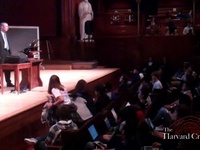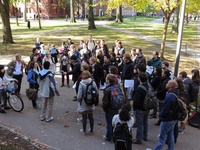UPDATE: 4:04 a.m. November 3, 2011
Nearly 70 Harvard student protesters walked out of Economics 10 on Wednesday afternoon, expressing dissatisfaction with what they perceive to be an overly conservative bias in the course.
The walkout was meant to be a show of support for the “Occupy” movement’s principal criticism that conservative economic policies have increased income inequality in the United States.
“Today, we are walking out of your class, Economics 10, in order to express our discontent with the bias inherent in this introductory economics course. We are deeply concerned about the way that this bias affects students, the University, and our greater society,” read a statement issued by the organizers.
Economics 10—more commonly referred to as “Ec 10”—is taught by professor N. Gregory Mankiw, and has the highest enrollment of any course at the College, boasting over 700 enrollees.
Mankiw, who was aware that student would be staging the walkout, began lecture by announcing his office hours.
“I was going to announce this at the end, but I have a feeling people might leave a little early,” he said.
At 12:15 p.m. students stood up en masse and walked out of Sanders Theatre, where Ec 10 lectures are held. Some students carried signs, but most left carrying just their backpacks. As the demonstrators marched out of Sanders Theatre, a small crowd booed them in support of Mankiw. Most students remained in their seats
After walking out, the group gathered in the hallway outside of the theater, standing in a circle and speaking out about the event.
“Harvard graduates have been complicit [and] have aided many of the worst injustices of recent years. Today we fight that history,” said Rachel J. Sandalow-Ash ’15, one of the students who organized the walkout. “Harvard students will not do that anymore. We will use our education for good, and not for personal gain at the expense of millions.”
Gabriel H. Bayard ’15, another organizer of the walk out, said that he believes the course is emblematic of the economic policies that have led the financial crisis.
“Ec 10 is a symbol of the larger economic ideology that created the 2008 collapse. Professor Mankiw worked in the Bush administration, and he clearly has a conservative ideology,” Bayard said. “His conservative views are the kind that created the collapse of 2008. This easy money focus on enriching the wealthiest Americans—he really operates with that ideology.”
Mankiw served as the chairman of the Council of Economic Advisers during the second Bush Administration and is currently an adviser to former Mass. Governor Mitt Romney’s presidential campaign. Mankiw declined to comment for this article.
Sandalow-Ash ’15 said that the course too heavily asserts conservative economic claims as fact.
“It’s a class that’s very indoctrinating, and does not encourage diversity of views. Economic questions are not always clear-cut. Multiple views should be presented in this course,” Sandalow-Ash said.
Many undergraduates remained skeptical of the demonstration’s mission.
Mark S. Krass ’14 said he believes the walkout’s intended goals were unclear, which detracted from the walkout’s message and comprises its integrity.
“Those of us who are supportive of Occupy Wall Street are trying very hard to combat the view that there is no set of objectives or ideology motivating that movement,” Krass said. “It was really distressing for people to advertise a walkout of Ec 10 on the basis of high textbook prices and bad teaching.”
Jeremy Patashnik ’12, an economics concentrator who authored a lengthy piece in defense of the course for the Harvard Political Review, rejected the notion that Ec 10 carries a conservative bias.
“I self-identify as a liberal on these issues, and I don’t see the conservative bias. I think this walkout misses the point of what Ec 10 is supposed to be,” Patashnik said. “This class is not attempting to give normative answers about how to address social issues. It’s meant to introduce students to economics as a social science.”
Krass noted that the topic of Wednesday’s lecture—income inequality—might have been particularly interesting to those who participated in the walkout.
“It’s incredible that in the name of advancing a more liberal view of economics they chose to walk out of a class on a social issue they care about,” Krass said.
According to those who walked out, part of the discontent with Economics 10 stems from what they say is the limited number of opportunities to express skepticism toward the material taught in the course.
“I’ve definitely written question marks in my textbook, but we never really get to question [what he says] in section,” said Alexandra E. Foote ’15, who is currently enrolled in the course. “I don’t know very much about economics, and it’s not really fair that I’m getting a skewed perspective.”
—Staff writer Jose A. DelReal can be reached at jdelreal@college.harvard.edu.
Read more in News
College Extends Early Action Deadline for Applicants Affected by Storm

















